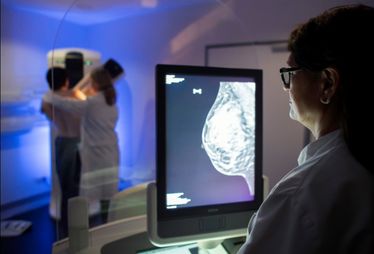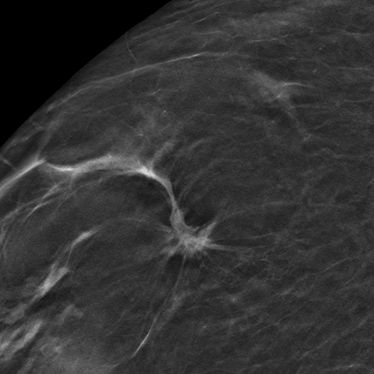Breast cancer detected more often than with standard mammographies
Typical examination for early detection of breast cancer by means of digital breast tomosynthesis (DBT) combined with synthetic 2D mammography. (Source: Reference Centre for Mammography Münster)
ToSyMa study on enhanced screening technology, involving almost 100,000 women, delivers first results
Meanwhile, breast cancer is the most frequent tumour disease worldwide. This is why, in Germany women aged 50 and over are offered systematic early detection examinations – so-called mammography screening.
The Clinic for Radiology at the University of Münster conducts research in the field of innovative imaging technologies and their impact on the efficiency of detecting breast cancer at an early stage. In the ToSyMa study, a combination of digital breast tomosynthesis (DBT) and so-called synthetic 2D mammograms was compared with the nowadays screening standard. Initial results from study phase 1 have been published in the latest issue of The Lancet Oncology. These results confirm the assumption that by using the new enhanced mammography technology, breast cancer is detected significantly more often than by using standard mammography. This observations is due to the fact that the innovative imaging method reduces the probability of masking radiological signs of malignancy by overlapping tissue structures.
The 17 study centres involved in the states of North Rhine-Westphalia and Lower Saxony were able to persuade almost 100,000 women to take part in the diagnostic comparative study. Study phase 2 will examine whether the increase in breast cancer diagnoses as a result of screening also leads to improved health in women. To this end, cancer register data will be evaluated up to two years after participation in the study.
The German Research Foundation (DFG) is providing funding for the follow-up-study – over 1.6 million euros up to 2025. In doing so, the DFG is supporting the aim of further improving the early detection of breast cancer. Breast tomosynthesis – an enhanced version of digital mammography – provides technology which, by computing pseudo-3D datasets, reduces any potential overlapping of tissue in the breast, thus promising benefits in making diagnoses.
The ToSyMa study was led by Prof. Walter Heindel, Director of the Radiology Department at Münster University Hospital (UKM), as principle investigator and the project manager Prof. Stefanie Weigel. Both expressed their gratitude to the 100,000 women who took part in the study: “It is only their participation that enables meaningful research to be carried out, and our thanks go also to the German Research Foundation with their funding for this large-scale, randomised diagnostic superiority study,” they said.
For the purpose of data collection for the study, women who had agreed to take part in the screening were allocated at random (with a probability of 1:1) either to the group using standard screening mammography or to the group using tomosynthesis combined with synthetic 2D mammography. In both groups, the detection rates for breast cancer were compared. The allocation was undertaken using a computer programme and could not be influenced by anyone (randomised controlled clinical study). Between 2018 and the end of 2020, women in North Rhine-Westphalia and Lower Saxony who received their regular written invitation to a screening also received an invitation (at random) to take part in the study.
Contact
Prof. Walter Heindel
Director of the Clinic for Radiology
and Head of the Reference Centre for Mammography Münster
University of Münster and Münster University Hospital
Albert-Schweitzer-Campus 1 (Gebäude A1), 48149 Münster
Tel.: +49 (0)251 83-45650
email: tosyma@ukmuenster.de
Original publication:
Digital breast tomosynthesis plus synthesized mammography versus digital screening mammography for the detection of invasive breast cancer (TOSYMA): a multicentre, open-label, randomized, controlled, superiority trial
Walter Heindel*, Stefanie Weigel*, Joachim Gerß, Hans-Werner-Hense, Alexander Sommer, Miriam Krischke, Laura Kerschke, for the TOSYMA Screening Trial Study Group
*WH and SW contributed equally to this work.
The Lancet Oncology 2022
Online/Comment:
https://doi.org/10.1016/PII



